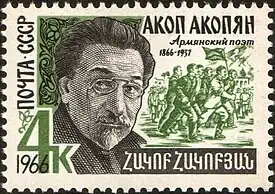Hakob Hakobian (poet)
Hakob Mnatsakani Hakobian (Armenian: Հակոբ Մնացականի Հակոբյան; often transliterated from Russian as Akop Akopian; 29 May 1866 – 13 November 1937) was a Soviet Armenian poet. He was regarded as the founder of Armenian proletarian poetry. Awarded with the titles People's Poet of Armenia and People's Poet of Georgia.[1] He was considered the "Armenian Maxim Gorky" by the Bolshevik press.[2]
Hakob Hakobian | |
|---|---|
 Hakob Hakobian | |
| Born | 29 May 1866 |
| Died | 13 November 1937 (aged 71) |
| Nationality | Armenian |
| Occupation | poet |
Hakobian published his first book in 1899. He authored revolutionary poems such as "One More Cut" (1905), "Revolution" (1905), "Died but didn't disappear" (1906), "Red waves" (1911), and "Shir-Kanal" (1924). Hakobian was appointed as the Bank's commissar of Soviet Georgia, he was a member of the government of Transcaucasian Federation.
Books
- Луначарский А. В., А. Акопян, в его кн.: Статьи о советской литературе, М. (in Russian), 1958;
- Саркисян Г., А. Акопян, Ер., 1956.
References
- Акопян Акоп, Great Soviet Encyclopedia (in Russian)
- газета "Путь правды", 13 сентября 1914 (in Russian)
This article is issued from Wikipedia. The text is licensed under Creative Commons - Attribution - Sharealike. Additional terms may apply for the media files.